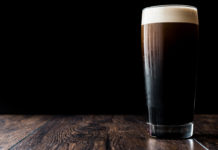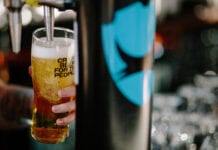Demand for lower-calorie and lower-ABV products said to be rising

HEALTH is often top of the agenda for people at the beginning of the year, and 2022 is expected to be no different.
For some customers, that will inevitably mean cutting down on the alcohol they consume – or cutting it out altogether. And so licensees were advised to ensure they have a selection of low and non-alcoholic options available to cater to health-conscious customers.
“Increasingly, consumers are enjoying alcohol-free drinks as a lifestyle choice, either having given up drinking alcohol altogether or by integrating lower alcohol choices as part of a wider drinking repertoire,” said Peter Gowans, country manager for Erdinger Alkoholfrei.
“Enforced time at home during pandemic lockdowns gave people the chance to experiment by researching and sampling drinks they may not have tried before and more health-conscious consumers are now actively searching for brands they discovered on their sofas when they are socialising out of home.”
As with several other established trends in the on-trade (such as premiumisation and demand for high standards of service) the growing popularity of healthier products is said to have been accelerated by the events of the past two years.
James Nichols, field sales controller at Vimto Out of Home, said although products such as soft drinks and no or low-alcohol brands will potentially prove more popular during January, they are “also well placed to capitalise on the ongoing macro trend of health across the year, as 70% of consumers in the GB on-trade said they are proactively trying to lead a healthy lifestyle”.
This statistic is even higher among those in the 25 to 30 age group, said Nichols, where it rises to 73%.
“This demonstrates the importance of having a range of products that appeal to all consumers,” he said.
John Gemmell, on-trade category and commercial strategy director at Heineken UK, agreed.
He said health and moderation “are becoming increasingly prevalent in drinkers’ lives” and so low and no-alcohol products have become a “must-stock” for licensed premises “as they are crucial for enticing health-conscious consumers into the on-trade and making them feel part of the occasion”.
And Ben Lockwood, marketing manager for the on-trade at BrewDog, said that although health may have become less of a priority for many during the lockdowns of 2020 and 2021, “it is now firmly back on the agenda”.
“Price, taste and availability have previously been the biggest barriers to consumption of low and no-alcohol products,” said Lockwood.
“Consumers expect the same level of experience that they get from alcoholic drinks, but in the past, they have had to compromise.
“However, the industry has invested significantly into the quality and marketing behind new products, as well as education, meaning there is now more choice than ever before, without having to compromise.”
All of which means that stocking a selection of healthier products is advisable if premises want to appeal to the broadest range of customers.
“Offering choice to consumers is key and treating the non-alcoholic options with the same care and attention that goes into the other drinks they offer,” said Florence Wong, communications manager at Fever-Tree.
“One example would be to include a non-alcoholic cocktail on their drinks menu.
“There are some fantastic alcohol-free spirits coming onto the market and mixed with our tonics make a fantastic tasting cocktail that is simple to make.”
Alex Carlton, the co-founder of alcohol-free brand Strykk, said the on-trade should “grab the opportunity” provided by non-alcoholic products by including several options on their drinks menus and making sure they are well promoted.
This can include the use of traditional point of sale materials including T-shirts, chalkboards and bar runners, said Carlton.
“The trade must review menus and ensure non-alcoholic cocktails are well covered, providing attractive options that keep drinkers happy,” he said.
Whether it’s stocking a selection of alcohol-free beers, lower-calorie soft drinks, or including a mocktail on the menu – or a combination of all three – one of the most important factors in appealing to health-conscious consumers will be to provide them with as much information as possible, according to Katie Walker, brand manager at cider maker Aston Manor.
Walker said that “transparency and education are key”.
“Consumers are seeking out more information about the products they’re buying,” said Walker.
“They want to know where the ingredients come from, the sustainability surrounding them and how they’re affecting their health in terms of sugar levels and calories.”























